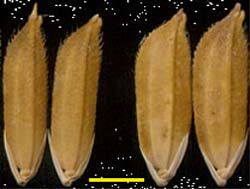

The grain size is significantly increased when GW2 is introduced into a small-grain rice variety. The scale is 3mm.
CAS researchers have made breakthrough progress in their genetic and gene functional analysis of important agronomic traits. A research team led by Prof. LIN Hongxuan from the Shanghai Institute of Plant Physiology and Ecology (SIPPE), the CAS Shanghai Institutes for Biological Sciences, is successful in cloning a gene underlying quantitative trait locus (QTL), a region of DNA, that controls grain weight and yield in rice. Their work has been reported online by Nature Genetics.
Many important agronomic traits in crop plants, including grain weight -- one of the most important components of grain yield, are complex traits controlled by QTLs, which are derived from natural variations in crops. However, the molecular roles of QTLs in the regulation of grain weight have not been fully elucidated. After many years' hard work, Prof. Lin and colleagues have obtained GW2, a new QTL that controls rice grain width and weight.
They discovered that GW2 encodes a previously unknown RING-type protein with E3 ubiquitin ligase activity, which is known to function in the degradation by the ubiquitin-proteasome pathway. Loss of GW2 function increases cell numbers, leading to a larger (wider) spikelet hull, and it accelerates the grain milk filling rate, resulting in enhanced grain width, weight and yield. Their results suggest that GW2 negatively regulates cell division by targeting its substrate(s) to proteasomes for regulated proteolysis.
The functional characterization of GW2 provides insight into the mechanism of seed development, according to experts. The feat, which is hailed as a significant piece of wok in the history of rice breeding for yield increase by a Nature Genetics reviewer, is believed to be a potential tool for improving grain yield in crops.
Lin and his group at the SIPPE-affiliated National Key Laboratory of Plant Molecular Genetics have been working on genetic and gene functional analysis of important agronomic traits such as yield, cooking and tasting quality, and stress tolerance or physiological tolerance, by using molecular marker on high density rice genetic linkage map, sequence data of rice genome, and genetic material constructed. Another of their recent achievements is the cloning of SKC1, a salt-tolerant functional gene of rice and making clear its biological functions and mechanisms.

86-10-68597521 (day)
86-10-68597289 (night)

86-10-68511095 (day)
86-10-68512458 (night)

cas_en@cas.cn

52 Sanlihe Rd., Xicheng District,
Beijing, China (100864)

